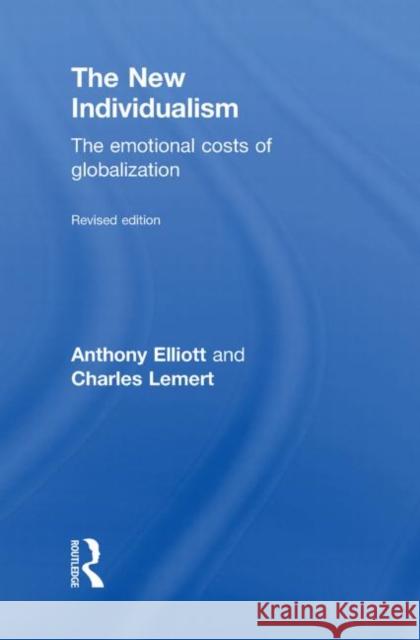The New Individualism: The Emotional Costs of Globalization Revised Edition » książka
The New Individualism: The Emotional Costs of Globalization Revised Edition
ISBN-13: 9780415560696 / Angielski / Twarda / 2009 / 218 str.
The New Individualism: The Emotional Costs of Globalization Revised Edition
ISBN-13: 9780415560696 / Angielski / Twarda / 2009 / 218 str.
(netto: 718,58 VAT: 5%)
Najniższa cena z 30 dni: 654,86
ok. 16-18 dni roboczych.
Darmowa dostawa!
This is a new and revised edition of a book which has had a major impact upon the social sciences and public political debate. Anthony Elliott and Charles Lemert's THE NEW INDIVIDUALISM inspired readers with the dramatic suggestion that 'the reinvention craze' - from self-help and therapy culture to management restructurings and corporate downsizings - is central to a 'new individualism' sweeping the globe. Giving particular attention to the narratives of people seeking to define anew their lives in an age of globalization, the authors contend that an endless hunger for instant change and relentless emphasis on self-reinvention is fundamental to grasping the disorientating effects of the new individualism. This edition contains a substantial new Introduction in which Elliott and Lemert reply to some of the standard criticisms made of the theory of the new individualism, and also addresses the escalation of new individualist thinking in the wake of recent global crises.
Corporate networking, compulsive consumerism, plastic surgery, therapeutic tribulations, instant identity makeovers and reality TV: welcome to life in our increasingly individualized world. In this dazzling book, Anthony Elliott and Charles Lemert explore the culture of the ‘new individualism’ generated by global capitalism and develop a major new perspective on people’s emotional experiences of globalization.
The New Individualism offers fascinating, but disturbing, accounts of people struggling to cope with a new individualism reshaping the world today. There is Larry, a high-tech executive ‘emotionally wrecked by success’; there is Ruth, a married woman in her late fifties, typing real-time erotica in cyberspace; there is Norman, a recovering drug addict infected with HIV, reinventing himself by accepting the deadly worlds for what they are; and Caoimhe and Annie, two little girls only beginning to explore the disorientating effects of the new individualism.
This book powerfully cuts against the grain of current orthodoxies that view globalization as corrosive of private life. Elliott and Lemert argue that today’s worlds are not only risky but deadly. Yet there is hope, the authors contend, beyond the complexities.
Voted into the 50 Best Management Books For 2006 by The Australian Financial Review.











